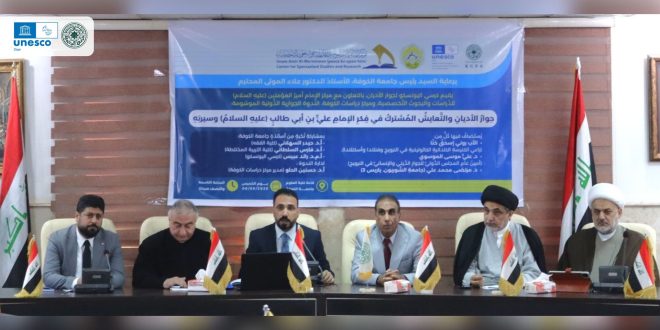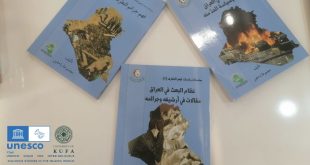Under the auspices of the UNESCO Chair for Interreligious Dialogue, and in collaboration with the Imam Amir al-Mu’minin (Peace Be Upon Him) Center for Specialized Studies and Research, as well as the Kufa Studies Center, an esteemed international symposium was convened under the title:
“Interfaith Dialogue and Peaceful Coexistence in the Thought and Practice of Imam Ali ibn Abi Talib (Peace Be Upon Him)”
The event took place in the grand hall of the College of Science on Thursday, May 8, 2025, at precisely 9:30 a.m.
The symposium witnessed the honorable presence of Dr. Haidar Saleh al-Shafie, Dean of the College of Science, alongside a distinguished assembly of professors, academics, researchers, and specialists. Notably in attendance were several esteemed organizations and committees, including the Popular Committee for the Protection of Antiquities and Heritage in Iraq and the Cultural Palace in Najaf.
The symposium graciously hosted a select group of revered guests:
• Father Rony Isaac Hanna, pastor of the Chaldean Catholic Church in Norway, Finland, and Scandinavia
• Dr. Ali Mousa al-Mousawi, Secretary-General of the International Council for Religious and Human Dialogue in Norway
• Dr. Murtadha Muhammad Ali, of Sorbonne University, Paris III, who participated via Zoom
A distinguished cadre of scholars from the University of Kufa contributed to the session, including:
• Prof. Dr. Haidar al-Sahlani (College of Jurisprudence)
• Prof. Dr. Fares al-Sultani (College of Mixed Education)
• Assoc. Prof. Dr. Raed Abis (UNESCO Chair)
The proceedings of the symposium were masterfully moderated by Prof. Dr. Hasanein al-Helou, Director of the Kufa Studies Center.
The gathering was inaugurated with a warm welcoming address delivered by Dr. Alaa Shatnan, Director of the UNESCO Chair for Interreligious Dialogue at the University of Kufa, wherein he eloquently outlined the Chair’s mission and its seminal role in cultivating dialogue and entrenching the principles of peaceful coexistence in Iraq. He emphasized the profound significance of this international symposium, which pays homage to a towering figure of Islamic civilization—Imam Ali ibn Abi Talib (Peace Be Upon Him)—whose legacy has left an indelible mark on the ideals of human solidarity and acceptance of the other.
The session commenced with a moving speech by Father Rony Isaac Hanna, who praised the Iraqi academic institutions for organizing a symposium inspired by the noble legacy of Imam Ali (Peace Be Upon Him). He described the Imam as a transcendent humanistic figure who epitomizes the spiritual essence that transcends religious boundaries. Father Hanna affirmed that “the Imam’s foundation for justice and advocacy for humanity is built upon integrity, sincerity, and communal peace,” emphasizing that “true peaceful coexistence emerges from embracing the other and accepting ethnic, religious, and sectarian differences.”
Joining from Paris via webinar, Dr. Murtadha Muhammad Ali expressed his deep pride in participating in a symposium honoring “the one who wore the mantle of the perfect human, making of his wisdom a ladder to peace, and of his humility a bridge between religions.”
Dr. Fares al-Sultani then elaborated on the nature of dialogue in the Imam’s thought, asserting that it was not a mere political choice, but rather a cosmic, unifying vision grounded in the equality of all creation. He cited the Imam’s timeless saying: “People are of two kinds: either your brothers in faith, or your equals in creation,” a profound declaration that elevates human dignity above all affiliations and legitimizes dialogue and shared existence.
For his part, Dr. Haidar al-Sahlani emphasized that Imam Ali was not only a theorist of ideals but a living embodiment thereof. He opened mosques to non-Muslims and made the public treasury a sanctuary for every person in need, regardless of their faith or sect.
Dr. Ali al-Mousawi portrayed Imam Ali as “the prophet of thought after the Prophet of revelation, and the voice of conscience after consciences fell silent.” He poignantly added, “We have read about Ali, but we have not read Ali,” lamenting the loss of the essence of this unparalleled human legacy amidst superficial interpretations.
Dr. Raed Abis remarked that coexistence in Imam Ali’s philosophy does not signify surrender but rather a conscious realization of a shared earthly fate and a divinely ordained eschatological destiny. He added that safeguarding churches and places of worship is intrinsic to this noble vision.
Before the conclusion, the floor was opened for discussion and interventions between the speakers and the audience, enriching the symposium with a fruitful and constructive exchange of ideas.
The symposium culminated in a series of key recommendations, including:
• Embedding the culture of dialogue within educational curricula
• Activating joint initiatives between adherents of various faiths
• Drawing upon the legacy of Imam Ali (Peace Be Upon Him) as a model of tolerance and human coexistence
The session concluded with the presentation of certificates of appreciation to the distinguished speakers and expressions of heartfelt gratitude to the honorable attendees, with aspirations for further symposia of similar spiritual and academic fruition.
 UNESCO CHAIR For Inter-Religious Dialogue Studies in The Islamic World
UNESCO CHAIR For Inter-Religious Dialogue Studies in The Islamic World













